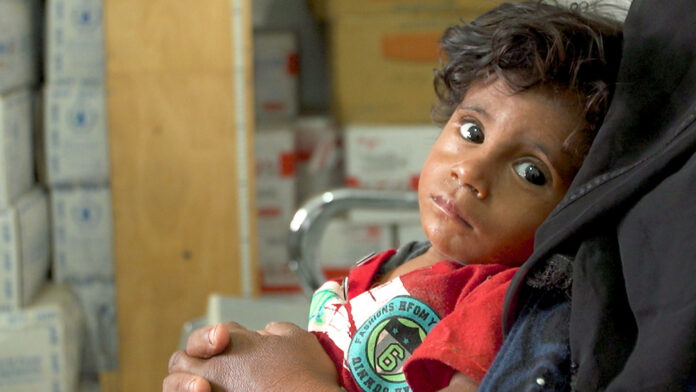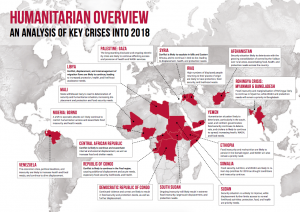This past year has been extremely difficult for some people. Hundreds of thousands of refugees or displaced persons and millions of people on the brink of starvation are the result of sectarian conflicts and corrupt leadership around the world.
The UN Office for the Coordination of Humanitarian Affairs (OCHA) has identified 12 areas that have been key crises of 2017 and will likely deteriorate into 2018. Israeli media, Ynet, covered some of these in their ‘Worst Crises of 2017’.
Myanmar
On August 25 there were two major events in the world – one made headlines around the globe, was covered 24/7, and its implications and damage are still evident. The other event didn’t get as much media coverage, but it may have become the worst humanitarian crisis of 2017. Many people will remember Hurricane Harvey, which hit Texas, but fewer will be aware of the Myanmar military operation against The Muslim Rohingyas – an even that has been called a “textbook example of ethnic cleansing”.
Thirty-eight people were killed in the level 4 hurricane, and the damage is estimated at about $200 billion. Doctors Without Borders says that only in the first month of violence in Rakhine, Myanmar, the home of the Muslim minority, were 6,700 people killed, including 700 children under the age of five.
Myanmar is a country with a predominantly Buddhist population, and for many years the Rohingyas were persecuted by the authorities and by extreme Buddhists, but the military operation that began on August 25 was a significant increase in violence against them. According to human rights groups, the Myanmar army set fire to whole villages of Rohingyas and entire families, including those locked in their homes and burned to death. However, they managed to escape the horrors and crossed the border to neighbouring Bangladesh and are now in extremely crowded refugee camps and under harsh sanitary conditions.
As of December 2017, 860,000 Rohingyas were living in refugee camps in the Kux Bazaar district of Bangladesh – about 600,000 of them came in the current wave of violence. The refugees, most of them women and children, suffer from trauma, and some suffer injuries from gunfire, shrapnel, fire and mines. The refugee camps in Bangladesh, which are already overcrowded, have difficulty providing basic services such as drinking water, medical care and sanitation. It is quite possible that we will hear about the outbreak of serious diseases among the Muslim refugees in Bangladesh in 2018.
The Myanmar government, led by Nobel Peace Prize laureate Aung San Suu Kyi, claims that the country’s army only responded to rebel attacks and that the military operation in the state of Rakhine was directed against “terrorists”. The government also claims that it was the rebels who set fire to the villages of their own people, the Rohingyas. Meanwhile, Bangladesh and Myanmar have agreed to return hundreds of thousands of Rohingyas to their country – but it is not clear exactly how this agreement will be implemented, who will guarantee the security of the Muslim minority and exactly where they are supposed to return after their villages have been destroyed.
Yemen
While there was a media frenzy over President Trump’s announcement he was moving the US embassy to West Jerusalem, few people will be aware that he made a much more serious announcement just after that headline-grabbing speech. While moving the US embassy to Jerusalem has been US policy since at least 1995, it was unusual for the US President to directly call on Saudi Arabia to lift the blockade of Yemen.
The figures from Yemen are appalling: 8.4 million are in danger of starvation, more than one million are infected with cholera, 8,600 are killed in the war, and 49,000 are wounded.
The United Nations held an emergency session, called by Turkey and Yemen, to claim that the announcement in some way was “imperilling the two-State solution”. Yet there has been no emergency session or Security Council resolutions even put forward to deal with the crisis in Yemen.
Venezuela
The economic crisis worsened in Venezuela, which until three decades ago was a strong and stable economy in South America. Venezuela has inflation in the hundreds of percent, high unemployment rates, and a severe shortage of basic commodities.
Hunger and distress have brought hundreds of thousands to the streets in the past year. Despite protests weakening, citizens remain hungry. The chronic shortage is sending millions to seek food wherever possible. According to a study published this year that nearly 75 percent of the country’s population lost 8.7 kilograms, and 81 percent of Venezuelan households are now living in income poverty.
Last September, President Maduro blamed “imperialists” for waging an “economic war” on Venezuela and suggested that people raise rabbits for food. However, starving Venezuelans looked for other solutions and have reportedly stolen animals from the zoo for food.
Gaza
The main problem on the Gazan agenda in the past year has been the electricity crisis. This year the crisis reached new heights, precisely because of the Palestinian Authority imposed a series of sanctions on the Gaza Strip to exhaust the Hamas administration. However, but those who suffered from the endless battle between Hamas and Fatah were the civilians.
As part of the sanctions, the Palestinian Authority stopped paying for diesel that is used to fuel the Gaza power plant. However, the sanctions have been tightened, and the PA has informed Israel that it is also ceasing to pay for electricity transferred to Gaza. As a result, electricity supply to an average home in Gaza has been reduced to two to three hours a day. The severe crisis in the Gaza Strip forced Hamas to pay Egypt to transport diesel to the power plant.
More than just electricity; the water in the Gaza Strip is salty, the sewage is being pumped into the sea to save electricity, and the unemployment rate is skyrocketing. The situation in the hospitals in Gaza is also bad. Only last week, work at Shifa Hospital – the largest hospital in the Gaza Strip – was halted due to severe sanitation problems after cleaning staff were not being paid. The Palestinian Health Minister transferred 1.8m shekels to solve the problem but the Palestinian Authority continues to delay deliveries of medicine.
Sudan
In 2011, South Sudan celebrated independence and became the 193rd country in the world. The streets of the capital Juba were filled with crowds of celebrants, foreign leaders came to welcome and participate in the historic status and euphoria prevailed everywhere. But six years later, the youngest country in the world has no real cause for celebration.
In December 2013, a new conflict broke out in the region when South Sudanese President Salva Kiir accused his deputy, Riek Machar, of planning a military coup against him. The war between the two officials escalated into a violent confrontation between the South Sudanese army and forces loyal to the rest of the country, characterized by ethnic warfare, sexual violence, starvation, and war crimes.
In December, a cease-fire agreement was signed by the two militant sides in South Sudan, with the ultimate attempt to end the civil war and bloodshed. The young state will need large international aid to get on its feet, rebuild itself and bring millions of people back to their homes. However, it seems that as long as the ethnic conflict is not resolved, the future does not hold much hope for the population who, in the past two years, have given up their independence celebrations due to the difficult economic and security situation.
[FBcomments]




